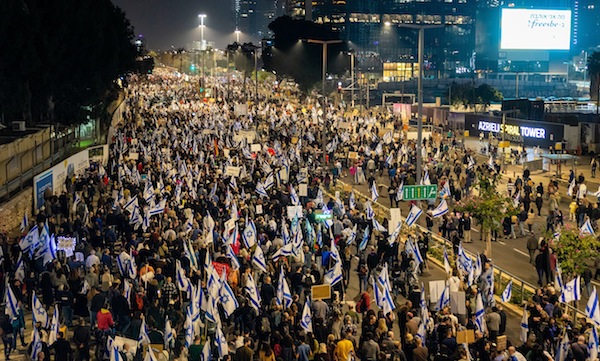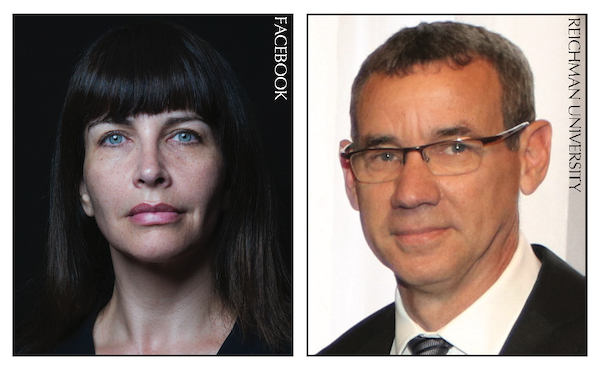Protesters in Rishon Le-Tzion Demonstrating against judicial reform February 25, 2023. (photo by Hayden)
It was a valuable experience to attend a protest rally in Rishon Le-Tzion. Several hundred people gathered in a city square to express concerns about the dramatic changes being initiated by the new Israeli government. The rally was more poignant, given that it was held in a square that commemorates people from this city who have died in combat.
As a Canadian, I had mixed feelings about attending. Who am I to be here protesting, as I don’t pay taxes and haven’t served in the army? On the other hand, the changes proposed by the government are going to affect Jews around the world and not just in Israel. Also, having three grandchildren in Israel increases my interest in what happens.
Rishon Le-Tzion, established in 1882, is well known as one of the first cities to be established in modern Israel. Its name, translating as “first in Zion,” says it all. The first Israeli Hebrew school was established here. Baron Edmond de Rothschild established what evolved to be a thriving wine industry here. The city predates the establishment of Tel Aviv by 27 years.
The square itself commemorates the large number of Israelis from Rishon Le-Tzion who have died in combat. Engraved in a monument is a listing, year by year, of names of the deceased. Israel today is one of the most successful countries in the world. When you visualize the large number of names engraved on these walls, it is clear that Israel’s achievements did not come without major losses of life.
The rally itself consisted of many people waving large Israeli flags. There were people of all ages, including many children present.
One of the speakers, Meir Sheetrit, served as minister of several different portfolios in previous Likud governments. Sheetrit was so respected that his name was brought forth as a candidate for the presidency of Israel in 2014. As a Likudnik, he decried the changes taking place and asserted that the current government is deviating radically from the direction of previous Likud governments.
Another speaker was Yair Golan, who was a member of the Knesset and has served on government committees. He was a former general in the Israel army and, at one point, was considered for the position of army chief of staff. He said he values a democracy that is based on law and not on tyranny, a press that is free and not based on peoples’ whims and a government that will protect the rights of minorities.
Merav Michaeli, the leader of the Labour party, was in attendance. She circulated through the audience, but, according to the protocols of the demonstration, being a sitting member of the Knesset, she was not permitted to speak.
The audience was mainly attentive, though occasional side conversations took place. People frequently erupted with Boosha! (Shame) in reference to various proposed government changes. The slogan De-mo-cra-tia frequently reverberated through the audience.
Periodic references were made to the diminishing status of women, LGBTQ+ people and minorities, especially Arab minorities, with the thought that these groups will bear the brunt of the changes.
Jews of non-Orthodox denominations feel that their rights will be diminished under the new government. The Women of the Wall fear they will always be relegated to second-class citizens when they pray at the Kotel. Several of the new government ministers want to cancel the annual Gay Pride parades. Many Israelis and leaders of other countries think the new government will end the possibility of ever having a two-state solution.
Most of all, people are concerned about the future of Israel’s fiercely independent judiciary. In a bill recently introduced into the Knesset, the government will have the ultimate say in who is appointed to the courts. Also, the Knesset will have the ability with a simple majority to overrule decisions of the Supreme Court. Many people, including a large number of Canadian judges and lawyers, have spoken out against these changes.
I came to Israel with major concerns about the new government’s policies and directions. It was instructive to see that a large percentage of the Israeli population shares similar feelings.
The demonstration I attended was only one of many that took place that night. According to reports in the press, there were 40,000 demonstrators in Tel Aviv, 20,000 in Haifa, 2,000 in Beersheva and smaller rallies all over the country. Clearly, a large percentage of the Israeli population strongly objects to the proposed changes. Large demonstrations occur every Saturday night, but also at other times during the week. If public engagement is a sign of a functioning democracy, then Israel is a healthy society.
Will these protests make a difference? So far, the new government has been firm in its conviction that major new directions are needed and is not backing down.
Rallies such as the one in Rishon Le-Tzion raise many questions. Are rallies an effective way to advocate for change in a society? Do democratic governments need to respond to what people participating in rallies are advocating? Are the proposed changes going to lead to a better or worse Israel? Is it important for Diaspora Jews to express their opinions about what is happening in another country far away?
As a Canadian, I came back with a firm opinion about the latter question. Diaspora Jews, who can be greatly affected by what is happening in Israel, need to express their opinions about the changes that may affect them. People who support democratic systems should weigh in anywhere in the world when they perceive that democracy is threatened.
But it is up to Israelis themselves to answer the basic questions as to what type of electoral and judicial systems they prefer. For the sake of the Jewish Diaspora and the rest of the free world, we hope that they will make the right decisions.
Larry Barzelai is a semi-retired physician living in Vancouver. He’s always had strong ties with Israel through the Canadian Zionist Federation, CJPAC and the annual Public Speaking Contest. His main connection now is his three grandchildren who call Israel their home.






